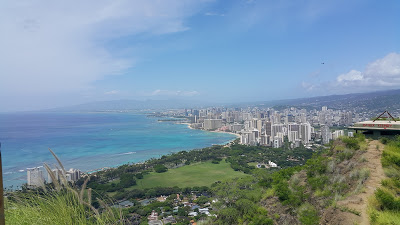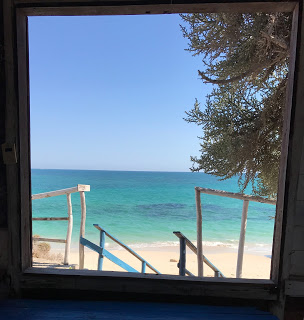Or: Some Reasons Why I Like the Ocean
I’ve been spending a lot of time in the ocean lately.
It’s been an interesting challenge to memorise 191 fishes (including the various stages of some which change colour and / or shape during their lifecycle). It’s all part of a larger exercise so I can help survey the fish species in this particular area.
That’s not what this post is about. It’s an aside.
It is about some of the 974 things I like about the ocean. In no particular order, it includes:
- the vastness of it and the interconnectedness – no matter where I am in the world diving, I’m in the same large expanse of water that anyone else that is near to a beach is also in (not including those artificial beaches or those ones that are really part of a canal or those places they call beaches that have nothing to do with the ocean – seems weird to write this kind of disclaimer but I know some people are pretty pedantic about this kind of thing). The ocean is huge. There’s so many things about it we still don’t know. Depths that haven’t been explored. Organisms not yet discovered. It’s also a very fragile ecosystem which is also pretty amazing considering how huge it is. It’s part of the problem as it seems people think it’s huge so dropping waste into it or fishing too much etc isn’t such a big deal since it really is “just a drop in the ocean”. These drops add up and that’s the crucial point we are at right now.
- the colours – the ocean is so many shades of blues, greens and even perfectly clear that it is difficult to pinpoint what colour it really is at any given moment in time. One of my high school science teachers tried to convince us the ocean is the colour it is because of Harpic Flushmatic. We were near a runoff area so there could be some element of truth in this.
- the changeability – tides come in and go out again pulled by the moon. We’ve just had a spring tide and it was the highest any of the villagers have seen here for a long time. On days when there is no wind, the ocean is peaceful, waves gently teasing the shore, inviting the sand to come and join it for a dip. On windy days, the ocean is angry, like a jilted lover, changing colours unpredictably into shades of greys, blacks and dark blues with waves pounding the shore and taking what it wants to back into itself. It is not dividing assets equally. It doesn’t care anymore.
- the sound – waves caressing the sand sound gentle and inviting. Waves pushed to shore from further out to sea sound aggressive yet somehow still peaceful as long as they are rhythmic. Either are great to watch and either can put me to sleep. It’s hypnotic.
- the salt – the smell of the ocean is now a bottled fragrance yet it still doesn’t compare to the original. The salt provides a layer to my skin so I know what my Smiths Salt n Vinegar chips really feel like. It makes my skin tingle as it dries and my hair curl in little knots that a comb has a poor chance of separating. The salt with the sea air is the feeling of life itself.
- floating – one of life’s simple pleasures is the ability to float and to sink. There is little freedom as much as being on or in the ocean surrounded by more ocean. We really are quite small.
- fishes – so many pretty colours, types and roles of each fish. There are fish that are responsible for making up to 90% of the sand that we walk on (thank you parrotfish for your poo), fish that try really hard to keep the ocean clean, fish that keep each other clean and others that stop some species growing to unsustainable levels plus others that are great for eating.
- sharks, turtles, whales, dolphins, rays, octopus, mantis shrimp – seeing any of these in the ocean is so incredibly fortunate as their populations are shrinking. Watching them in their natural environment playing, feeding and / or just moving is amazing and very peaceful. It is a great reminder that they belong there and I don’t given the grace with which I move compared to them and the purpose they have in being there.
- corals – the protector of land from waves and wind. The importance of coral and how we treat the reefs worldwide is often seen from a tourism point of view. The need to do it is more than the tourist dollar and protecting the colours. It is crucial to many societies surviving. It’s also impressive that it’s really a bunch of animals all working together to gather nutrients and grow.
- nudibranchs – these are the most dazzlingly patterned creatures of the underwater world and I can’t get enough of seeing them. They are difficult to spot as they are usually quite small. They are also quite toxic to their predators.
- other stuff that’s in there too – starfish, sea cucumbers, urchins etc and even the jellyfish, they are all impressive in their own way and each contribute something important to the ecosystem. I’m not a big fan of the urchins though after having stood on one in my younger days. Sea cucumbers can even spit out their entire stomachs and remake themselves from the inside out. Starfish can regrow appendages and some even can reproduce this way – I’m looking at you Crown of Thorns! This particular starfish is a menace in some areas where it has been unintentionally introduced (e.g. the Great Barrier Reef) whereas it is a crucial part of the ecosystem in other areas helping to keep the population of fast growing corals down so the slower growing ones stand a chance of having some space left to grow in.
- buried treasure – I’m yet to see this in the ocean but I am keeping my eyes out. There must be more down here somewhere!
- scuba diving – I still maintain the only regret I have is not having studied for my scuba diving licence sooner. Being in the underwater paradise, floating in three dimensional space is the closest I am likely to ever be to being an astronaut in outer space. The weightlessness, the unusual yet beautiful creatures, the reliance on myself and my equipment to breathe and stay alive, it is an experience for which I’m grateful every time I dive.
It’s for these reasons (plus the rest of the 974 that I haven’t mentioned) I am in Madagascar at the moment learning how to tell 191 fishes apart from one another. It is part of a longitudinal study that has been going for about ten years now and these fishes have been selected as indicator species as to the state of the environment and the ocean itself in this area.
The local village is actively involved and supportive and works with this organisation to declare marine reserves and to change their fishing practices where appropriate. To be a part of an organisation that is working so well with the local community is rewarding as it is obvious the villagers are grateful for the work the organisation has completed already and would like it to continue.
I want to help ensure that fishing can be done in a sustainable way and the environment is protected so others can have these experiences too.
* Thanks to Enya for the title to this post.


